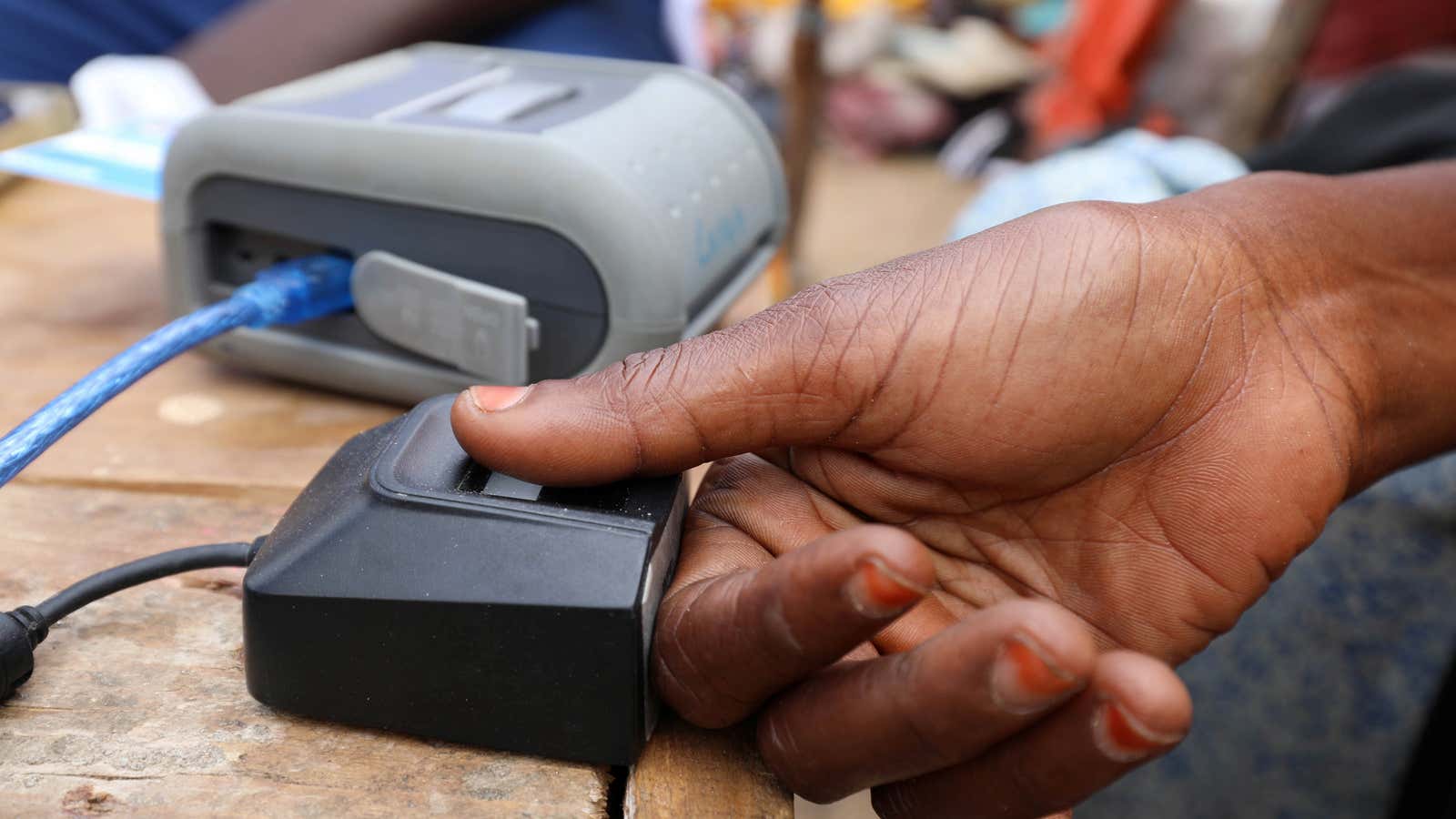Ghana has moved to integrate telecommunications, banking, and mobile money platforms under the Ghana Card—a biometric means of personal identity—which will now be a prerequisite for all financial transactions starting July 1.
In a move that mirrors what is going on in other African countries such as Uganda and Zimbabwe pushing for biometric identity documents, including electronic passports, Ghana has gone a step further by officially requiring that mobile phone sim cards, mobile money, and banking accounts be linked and integrated into the Ghana Card. The Ghana Revenue Authority will also replace tax identification numbers to match the Ghana Card pin number starting March 31.
While the move has not been met with as much backlash in Ghana as similar biometric registration processes in other African countries, Ghanaians are concerned about the unrealistic timeline of having all mobile wallets and banking accounts integrated into the Ghana card by July 1st (pdf), in addition to privacy concerns and what is seen as a power play between various agencies.
Bright Simons, the founder of mPedigree, a tech platform, and prominent commentator on Ghanaian tech and fintech policies, told Quartz “there is a tussle over valuable data-driven economic opportunities between the two (personal identification) contractors” in Ghana.
Why was the Ghana card introduced?
“By syncing banking and mobile money platforms into the country’s biometric personal identification document, the reserve bank of Ghana is essentially seeking to ensure that all activities can be verified by the National Identification Authority systems.” This is according to Murega Mungai, the head of trading desk at AZA Finance, a provider of forex and treasury services in Africa.
According to Ato Ulzen-Appiah, a digital influencer in Accra, “the biggest challenge is that the pace of getting the majority of Ghanaians registered for the Ghana card is slow.”
Other experts however, see this as the onset of commercialization of personal private data in Ghana by the country’s two personal and communications identity system authorities, the National Identity Authority and the National Communications Authority.
Simons says “models keep being devised to delegitimize all other identity cards and to force the consolidation of not just personal identifiable data but also data on as broad a range of personal transactions as possible into databases controlled by one of these two.”
Monetary authorities in Ghana say integration of banking, telecom, and mobile money into the Ghana Card will make transaction tracking seamless. This comes as cases of fraud involving mobile money platforms are on the increase in Ghana, with statistics from the cybercrime unit of the Ghana Police Service showing over 300 reported cases in 2019.
But for Prince Senyo, associate professor for fintech and information systems at Southampton Business School, “focus should be on the use of emerging technologies like artificial intelligence and machine learning (pdf) to develop algorithms that can automatically detect, flag, and temporarily block potential fraudulent transactions” for further investigation by authorities.
Requesting for ID cards before withdrawals “will not solve mobile money fraud,” he said in a recent blog post. “Fraudsters can easily use fake IDs for transactions.”
Adoption of mobile money in Ghana is on the rise
Usage and adoption of mobile money platforms, which Ghanaian President Nana Akufo Addo intends to tax at a rate of 1.75% starting next month, has been soaring. The value of mobile money based transactions will have jumped from $20 billion in 2016 to $99 billion by the end of 2022, according to the country’s Finance Ministry.
The Ghana communications and digitalization minister, Ursula Owusu-Ekuful, says that “the prevalence of fake IDs led to unscrupulous individuals procuring hundreds” of SIM Cards and that this was leading to cases of fraud.
In support of the Ghana Card integration, the Bank of Ghana said the biometric identity card will enhance Know Your Customer (KYC) modalities in the financial sector.
“The National Identification Authority verification transaction platform will be integrated into the Bank of Ghana’s financial monitoring platform,” Sandra Thompson, secretary for the Bank of Ghana said in the notice dated Jan. 19 (pdf). This is being done to ensure that all financial transactions performed within the ecosystem are linked to one identity.
There have been some glitches though, with Ghanaians encountering challenges and delays when registering for the Ghana Card and when registering mobile sim cards with the new identification document.
Sign up to the Quartz Africa Weekly Brief here for news and analysis on African business, tech and innovation in your inbox
